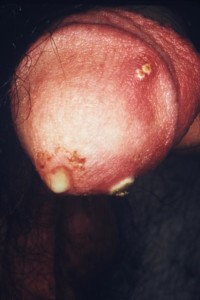
Definition
Gonorrhea is type of sexually transmitted infection (STI).
Causes
Gonorrhea is caused by the bacterium Neisseria gonorrhoeae . It is passed during vaginal, oral, or anal sexual intercourse.
Risk Factors
Factors that increase your chance of contracting gonorrhea include:
- Multiple sex partners
- Having sex without a condom
- History of having a sexually transmitted infection
symptoms
Many people that are infected will have symptoms. Symptoms may appear 1-14 days after contact with an infected partner. In some cases, symptoms do not occur for up to a month.
People with gonorrhea may experience some, all, or none of the following:
In Men
- Discharge from the penis
- Burning sensation while urinating
- Tender or swollen testicles
In Women
- Burning sensation while urinating
- Abnormal vaginal discharge
- Abdominal pain
- Unusual vaginal bleeding
In Men and Women with Rectal Infections
- Anal itching
- Soreness
- Bleeding
- Painful bowel movements
Gonorrhea Complications
If gonorrhea is not treated, it can cause problems such as:
In Men
- Testicles— epididymitis, a painful condition of the testicles that may lead to infertility
- Prostate— Prostatitis, swelling and infection in the prostate
- Urethra—scarring on the inside of the tube that allows urine to pass out the body, can make it difficult to urinate
In Women
- Reproductive organs—due to pelvic inflammatory disease (PID), a serious infection that can affect fertility
- Infection in a newborn infant if you are infected during pregnancy
Diagnosis
Two tests are commonly used to diagnose gonorrhea:
- Nucleic acid probe test—Discharge or urine is tested for specific acids. These specific acids indicate gonorrhea.
- Laboratory culture—A smear of the discharge is taken. It is sent to a lab. After two days, the culture is checked for growth of the bacteria.
Your doctor will likely also test you for the presence of other STIs including chlamydia, syphilis, and HIV.
Treatment
Your doctor will prescribe antibiotics. Some strains of gonorrhea have developed resistance to certain antibiotics. You and your doctor will work together to find an antibiotic that is effective.
It is important to take all of the medication as prescribed. All of your sexual partners should be tested and treated. Do not have sex again until you and your partners have completed treatment and no one has symptoms.
Check here for your nearest NAFDAC registered chemist. You should always buy your drugs from registered chemist. Also check the registered number of your drugs using regcheckr tool.
Prevention
The most effective way to prevent an STI is to abstain from sex. Other preventive measures include:
- Use condoms during sexual activity.
- Have sex with only one partner who has sex only with you.
- Have regular check-ups for sexually transmitted infections.
Some other barrier methods of contraception may provide some protection. Talk to your doctor about your options.
As a woman, your health concerns are as unique as your body. How you take care of yourself has a huge impact on your future, affecting everything from your ability to have children to your risk of heart disease. There’s no substitute for good health, and when it’s gone, it’s often gone for good. Don’t let it pass you by.
If you like our health updates, please like us on our facebook page or follow us on twitter.
We welcome feedback. We are also currently looking for content writers on medical issues. Please get in touch with us by filling the form ->here
REFERENCES:
Centers for Disease Control and Prevention. Antibiotic-resistant gonorrhea. Centers for Disease Control and Prevention website. Available at http://www.cdc.gov/std/gonorrhea/arg/default.htm


Leave a Reply